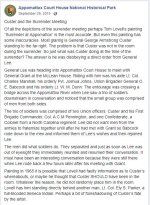I'm looking for something that covers his early life to the end of the Civil War. I want to know why they promoted him to Brigadier General after promoting him from Second Lieutenant to Captain then busting him back down to First Lieutenant.
I want to know how he managed to fight J.E.B Stuart to a standstill.
I want to know if he really went through an article 32 at West Point that almost ended his career before it started or was that just a myth
"Crazy Horse and Custer" by Stephen Ambrose covers the promotion to brigadier general pretty well. As a lieutenant, Custer had served on General George McClellan's staff, and fought during the Peninsula Campaign that began in the spring of 1862. Custer persuaded a colonel into allowing him to lead an attack with four companies of Michigan infantry across the Chickahominy River above New Bridge. The attack was successful, capturing 50 Confederates. Major General George B. McClellan, commander of the Army of the Potomac, termed it a "very gallant affair," congratulated Custer personally, and brought him onto his staff as an aide-de-camp with the temporary rank of captain.
Custer earned a reputation for both bravery and brashness. He also became known as a publicity hound, taking every opportunity to get himself in front of the newspapermen documenting the war.
His primary benefactor, though, was Major General Alfred Pleasonton, commanding a cavalry division. After Chancellorsville, Pleasonton became the commander of the Cavalry Corps of the Army of the Potomac and his first assignment was to locate the army of Robert E. Lee, moving north through the Shenandoah Valley in the beginning of the Gettysburg Campaign. Custer distinguished himself by fearless, aggressive actions in some of the numerous cavalry engagements that started off the campaign, including Brandy Station and Aldie.
Three days prior to the Battle of Gettysburg, at General Pleasonton's urging, General Meade promoted Custer from first lieutenant to brevet brigadier general (temporary rank) of volunteers. Pleasonton desperately needed to shake up the Cavalry Corps, which had not been doing well in its battles with Stuart, and he wanted fresh young men at the top. Pleasonton simply wanted the hardest driving, most ambitious young officers to give his cavalry some spirit and he saw this in Custer.
Custer played a key role at the Battle of Gettysburg, preventing General J.E.B. Stuart from attacking Union troops, and later capturing Confederates fleeing south after the Union victory. But his brigade lost more than 250 men, the highest of any Union cavalry unit. Custer's units would continue to rack up a disproportionate number of casualties throughout the war. According to Ambrose's book, Custer's style of battle sometimes bordered on reckless or foolhardy. He often impulsively gathered up whatever cavalrymen he could find in his vicinity and led them personally in bold assaults directly into enemy positions. One of his greatest attributes during the Civil War was luck, and he needed it to survive some of these charges.
His aggressive battle tactics seemed to be just what the Union Army needed at the time he was promoted, and although his tactics lacked imagination his recklessness carried him through. Unfortunately, that same lack of imagination and his recklessness is what got he and his final command wiped out.


